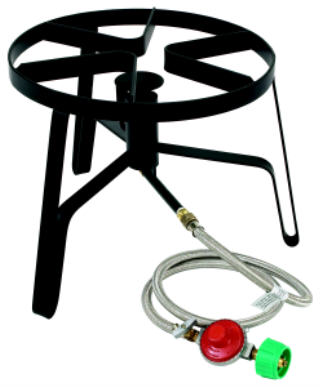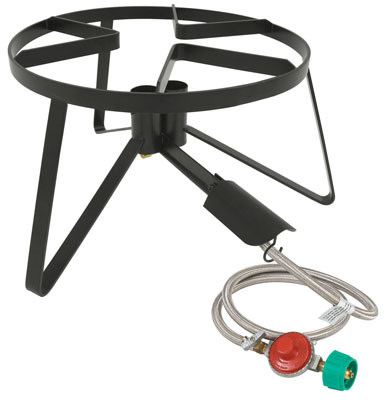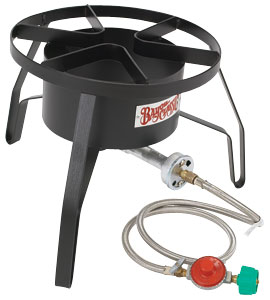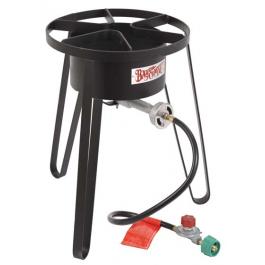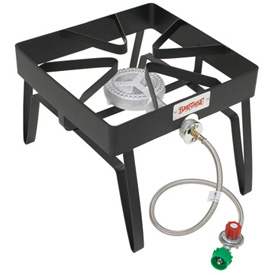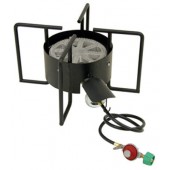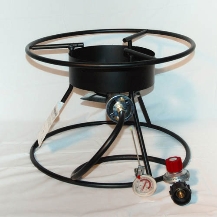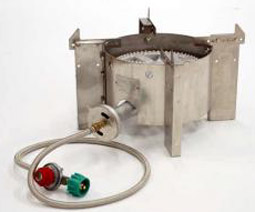WrongCoastBrewery
Well-Known Member
After seeing many people, both novice and advanced, have many debates about what is better and which burner to buy, I figured I would put some myths about burners to rest. Plus, I wanted to make a convienient place to find out about many of the burners in use out there. So here it goes:
BTUs - The Beginning
BTU, or British Themal Unit, is a unit of measure of power, or heat input in the US. When done so, the actual unit is BTU/h. Another way you could see BTU used is the measure of a heat value for fuel. Typically though, in homebrewing and burners, you will see it used more for heat input. Remember this as it comes into play later.
So what is a BTU? Well, the scientific definition is the amount of energy required to raise 1 pound of water 1 degree at constant atmospheric pressure. Another way you could compare this is by striking and burning one wooden match. That would be the approximate equivalent.
Burners & Brewers
Ok, so enough of the scientific mumbo jumbo. How does this tie into homebrewing? Well, all of us want to make better beer right? And one way is to do full boils. Another is AG. Besides Deathbrewer's Stove Top All Grain method, burners are the way to do it, especially since larger quantities of water are needed to be heated to specific temperatures. A good propane burner can hit temperature marks with no problem and then keep them there with minimal adjustments. Personally, my electric stove had a hard time even maintaining 155F without major adjustments to the heat. And a boil larger than 2.5 gallons? Dont even think about it. The most I ever did was 3 gallons and that took over an hour.
So burners are a great tool in the brewing process and IMHO one of the most valuable. Mine personally lowered my brew time by up to an hour. I tested mine as well and it took 15 minutes to boil 5 gallons of water in a stainless steel pot. But, this wouldnt be an objective article without knowing the both the pros and cons.
Pros
Better Hop Utilization, Easier steeping times, Easy to hit and maintain various temperature marks, Faster boils, Larger boils, Keeps the kitchen a bit cleaner and the stove is freed up
Cons
Must use outdoors, propane is flammable therefore dangerous if used incorrectly, Propane bottles can easily become headaches when the laws change about various features on them
In the end, you are ultimately the deciding factor on use or non use. Things to remember are "Do I have the adequate space?", "Can I use it on my balcony(for you apartment and condo people)?", "Am I willing to stand out in the cold to brew?". I would gamble most of us would say yes to that last one.
Brewing & the Fire Dept
"But how is the Fire Deptarment involved with brewing?"
Well, its not really unless you are a fire fighter(my hats off to you) or know some who homebrew. The other reason would be if you set something on fire. Does it happen? Yup. Just ask the guy who ruined the turkey when he burnt his house down. Like anything that involves flames, gases at pressure, and/or drinking, things can get out of hand. Still safety is paramount when using anything propane fueled. But then again, lets face it safety can ruin the fun too.
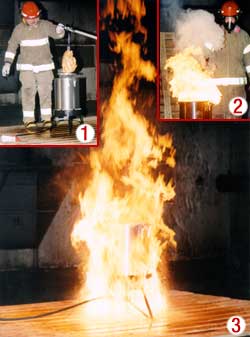
First off, somethings great things to remember are those various safety tips that will save you from being that turkey guy. They are:
1. Always use in a well ventilated area. Outside is a good spot.
2. Ensure your equipment is in good working order (i.e. current hydro on tank, hose not damaged, ect.).
3. Always light the burner with your body being a safe distance. those long Bic BBQ lighters are great.
4. Make sure the gas is off when not in use.
5. Ensure you have quick and easy access to a way to put out a fire if it occurs.
But what about when safety gets in the way? Well, this is something that I feel requires extra note of. Especially right around the holidays, turkey fryer kits are abundant. In recent years, many of unsuspecting chefs have burned down decks, houses, and themselves. To combat this, the companies started to put timers on the regulators. So in order to keep the flame going, you have to push a button. To a brewer, this can be a fun killer. Be very aware that while this safety feature is good to have, it does tend to be a big pain in the butt for brewers. So what does this mean?
Look for units that don't have this feature.
But remember, safety is still paramount.
Burning a hole in your pocket
So now you want to buy this great tool. Indeed you should. But there are still a few things you may want to consider.
Remember, no burner is complete without a fuel source. 20lb propane bottles can run right around $30-40 new. These are usually empty and carry the latest safety features that are required by law. To fill one can then cost $10-15 depending on your local cost.
Another option is a tank exchange. Places like Sears, Home Depot, and Lowes usually have a tank exchange service. Where I live, they even have one that delivers to you. Basically you bring your emty tank in and exchange for a another that is full. These can run $15-20 each time, but can be a blessing when you dont have to mess around with faulty valves, tanks that havent hydro'd in a while, or finding a station to fill them.
What about the type of burner and its ratings? Figuring out the happy medium of heat input and price is the tricky part. One way to help is if you know what size of boil and brewing equipment you will be using. Is a 210,000 BTU burner needed to do a partial boil. Nope. But if you plan to upgrade to keggles or a larger pot, maybe. Another thing is to avoid the urge to go for overkill. Tim "The Toolman" Taylor might approve but in the end it could be nothing more than a waste.
Remember that thing I told you to remember about BTUs? Well, BTU ratings of burners are heat output only. That means the number that comes along with it is what the burner can put out at the ideal level. In the end, your pot wont see all that power. Often brewers are annoyed because there super duper heavy duty burner doesnt hack it. Amazing how companies try to make their product sound great. Many other factors go into why a pot boils faster or slower with a burner. Weather, barometric pressure, design features and initial temperature of the water all come into play. Another is the amount of oxygen mixed with the propane. Most burners come with a plate that is adjusted to regulate the mix better. Blue flames = good (hotter), Orange = bad(less so). So just because your burner you bought says its a 1,000,000 BTU burner doesnt mean your pot will be fully subjected to it.
BTUs - The Beginning
BTU, or British Themal Unit, is a unit of measure of power, or heat input in the US. When done so, the actual unit is BTU/h. Another way you could see BTU used is the measure of a heat value for fuel. Typically though, in homebrewing and burners, you will see it used more for heat input. Remember this as it comes into play later.
So what is a BTU? Well, the scientific definition is the amount of energy required to raise 1 pound of water 1 degree at constant atmospheric pressure. Another way you could compare this is by striking and burning one wooden match. That would be the approximate equivalent.
Burners & Brewers
Ok, so enough of the scientific mumbo jumbo. How does this tie into homebrewing? Well, all of us want to make better beer right? And one way is to do full boils. Another is AG. Besides Deathbrewer's Stove Top All Grain method, burners are the way to do it, especially since larger quantities of water are needed to be heated to specific temperatures. A good propane burner can hit temperature marks with no problem and then keep them there with minimal adjustments. Personally, my electric stove had a hard time even maintaining 155F without major adjustments to the heat. And a boil larger than 2.5 gallons? Dont even think about it. The most I ever did was 3 gallons and that took over an hour.
So burners are a great tool in the brewing process and IMHO one of the most valuable. Mine personally lowered my brew time by up to an hour. I tested mine as well and it took 15 minutes to boil 5 gallons of water in a stainless steel pot. But, this wouldnt be an objective article without knowing the both the pros and cons.
Pros
Better Hop Utilization, Easier steeping times, Easy to hit and maintain various temperature marks, Faster boils, Larger boils, Keeps the kitchen a bit cleaner and the stove is freed up
Cons
Must use outdoors, propane is flammable therefore dangerous if used incorrectly, Propane bottles can easily become headaches when the laws change about various features on them
In the end, you are ultimately the deciding factor on use or non use. Things to remember are "Do I have the adequate space?", "Can I use it on my balcony(for you apartment and condo people)?", "Am I willing to stand out in the cold to brew?". I would gamble most of us would say yes to that last one.
Brewing & the Fire Dept
"But how is the Fire Deptarment involved with brewing?"
Well, its not really unless you are a fire fighter(my hats off to you) or know some who homebrew. The other reason would be if you set something on fire. Does it happen? Yup. Just ask the guy who ruined the turkey when he burnt his house down. Like anything that involves flames, gases at pressure, and/or drinking, things can get out of hand. Still safety is paramount when using anything propane fueled. But then again, lets face it safety can ruin the fun too.

First off, somethings great things to remember are those various safety tips that will save you from being that turkey guy. They are:
1. Always use in a well ventilated area. Outside is a good spot.
2. Ensure your equipment is in good working order (i.e. current hydro on tank, hose not damaged, ect.).
3. Always light the burner with your body being a safe distance. those long Bic BBQ lighters are great.
4. Make sure the gas is off when not in use.
5. Ensure you have quick and easy access to a way to put out a fire if it occurs.
But what about when safety gets in the way? Well, this is something that I feel requires extra note of. Especially right around the holidays, turkey fryer kits are abundant. In recent years, many of unsuspecting chefs have burned down decks, houses, and themselves. To combat this, the companies started to put timers on the regulators. So in order to keep the flame going, you have to push a button. To a brewer, this can be a fun killer. Be very aware that while this safety feature is good to have, it does tend to be a big pain in the butt for brewers. So what does this mean?
Look for units that don't have this feature.
But remember, safety is still paramount.
Burning a hole in your pocket
So now you want to buy this great tool. Indeed you should. But there are still a few things you may want to consider.
Remember, no burner is complete without a fuel source. 20lb propane bottles can run right around $30-40 new. These are usually empty and carry the latest safety features that are required by law. To fill one can then cost $10-15 depending on your local cost.
Another option is a tank exchange. Places like Sears, Home Depot, and Lowes usually have a tank exchange service. Where I live, they even have one that delivers to you. Basically you bring your emty tank in and exchange for a another that is full. These can run $15-20 each time, but can be a blessing when you dont have to mess around with faulty valves, tanks that havent hydro'd in a while, or finding a station to fill them.
What about the type of burner and its ratings? Figuring out the happy medium of heat input and price is the tricky part. One way to help is if you know what size of boil and brewing equipment you will be using. Is a 210,000 BTU burner needed to do a partial boil. Nope. But if you plan to upgrade to keggles or a larger pot, maybe. Another thing is to avoid the urge to go for overkill. Tim "The Toolman" Taylor might approve but in the end it could be nothing more than a waste.
Remember that thing I told you to remember about BTUs? Well, BTU ratings of burners are heat output only. That means the number that comes along with it is what the burner can put out at the ideal level. In the end, your pot wont see all that power. Often brewers are annoyed because there super duper heavy duty burner doesnt hack it. Amazing how companies try to make their product sound great. Many other factors go into why a pot boils faster or slower with a burner. Weather, barometric pressure, design features and initial temperature of the water all come into play. Another is the amount of oxygen mixed with the propane. Most burners come with a plate that is adjusted to regulate the mix better. Blue flames = good (hotter), Orange = bad(less so). So just because your burner you bought says its a 1,000,000 BTU burner doesnt mean your pot will be fully subjected to it.


